Latest News
02 November 2021
Marileen Dogterom elected as KNAW president

We warmly congratulate professor Marileen Dogterom on her appointment as the president of the Royal Netherlands Academy of Arts and Sciences (KNAW), the forum, conscience, and voice of the arts and sciences in the Netherlands, effective June 1, 2022.
30 August 2021
Catch me if you can: a revolutionary method to study single proteins
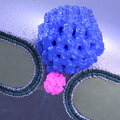
Researchers from the technical universities of Delft and Munich have invented a new type of molecular trap that can hold a single protein in place for hours to study its natural behavior – a million times longer than before.
30 June 2021
A new spin on making minimal cells
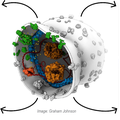
The ability of a cell to separate its own matter from its surroundings is a basic requirement for life. A team of researchers at AMOLF and Delft University of Technology have managed to create a synthetic container, or lipid vesicle, that is able to hold a range of different biological systems: from a cytoskeleton to entire E.coli bacteria. Their findings on this optimized cDICE method, which has the potential to reveal the inner workings of life, are published in ACS Synthetic Biology on DATE.
06 May 2021
Researchers discover how a cell’s armour can be both flexible and strong
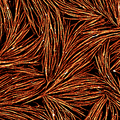
Medieval knights either had thick, cumbersome armour, or they could wear less protective armour and be flexible in combat – they couldn’t have both. Cells, on the other hand, do have it all. Researchers from Delft University of Technology (TU Delft), Leeds University, Institut Fresnel in Marseille, and Institut Curie in Paris discovered that proteins called ‘septins’ reinforce the fragile membrane of a cell, while still being flexible enough to allow the cell to change shape.
29 April 2021
Researchers create living material based on algae
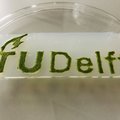
Researchers led by Delft University of Technology (TU Delft) used 3D printing to create a novel, environmentally-friendly and living material made of algae that has many potential applications.
14 April 2021
Chirlmin Joo receives VICI grant for identifying proteins one at a time
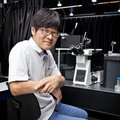
Researcher Chirlmin Joo of TU Delft will receive a VICI grant for developing a method to sequence proteins one at a time. He will receive 1.5 million euros from the Netherlands Organisation for Scientific Research (NWO).
26 March 2021
Researchers shed new light on DNA replication
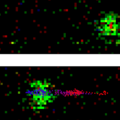
In preparation for cell division, cells need to copy (‘replicate’) the DNA that they contain. A team of researchers from TU Delft, collaborating with investigators from the Francis Crick Institute in London, has now shown that the protein building blocks involved in the initial steps of DNA replication are mobile but reduce their speed at specific DNA sequences on the genome. Their findings, which will be published on 26 March in the open-access journal Nature Communications, were facilitated using an integrated approach involving biophysics and biochemistry that will propel new discoveries in the field.
18 March 2021
Faculty of Applied Sciences attracts four new Marie Curie Fellows
The Faculty of Applied Sciences has attracted four talented international researchers through the Marie Skłodowska-Curie Actions Individual Fellowships programme of the European Union. The new Fellows are: Anders Barth (Bionanoscience), Baptiste Heiles (Imaging Physics), Josep Ingla-Aynés (Quantum Nanoscience) and José Palomo Jiménez (Chemical Engineering).
08 March 2021
New test makes detection of genetic material visible to the naked eye
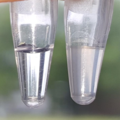
Onderzoekers van de TU Delft hebben een test ontwikkeld waarmee ze specifieke stukjes genetisch materiaal kunnen opsporen, waarna de uitslag met het blote oog af te lezen is. Met de test kunnen onder meer virussen, zoals het coronavirus, en antibioticaresistente bacteriën snel en goedkoop worden gedetecteerd. De resultaten zijn gepubliceerd in Biophysical Journal.
15 December 2020